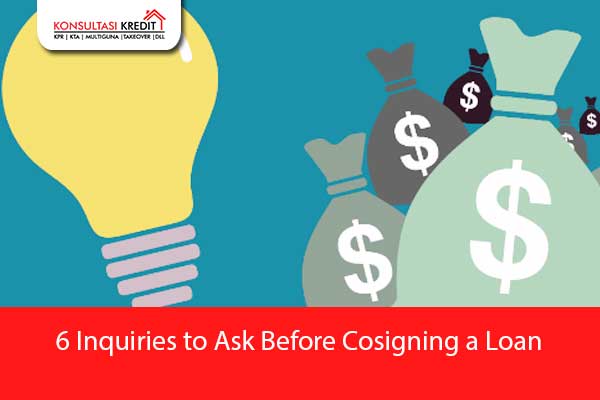6 Inquiries to Ask Before Cosigning a Loan. If a pal or relative can’t get approved for a loan on their own, there’s an opportunity they’ll ask you to guarantee. That indicates you’ll virtually be assured the investment for your loved one. Your credit scores and income will undoubtedly be taken into consideration by the loan provider in choosing whether to accept or reject the loan; the loan will appear on your debt record, as well as the financial institution might try to gather from you if the key customer doesn’t pay.
Guaranteeing a loan is a serious matter. Your credit rating will take a hit if the critical consumer fails to make payments promptly, and you could be required to pay the loan back if the leading consumer quits making payments or dies before the loan is settled. As well as because the loan is listed on your credit rating report, you can have a tough time obtaining your financing if it looks as though you’re also deeply in the red.
As you can see, there are some significant disadvantages to cosigning. Yet you might still consider doing it to help out a person you enjoy. In that situation, there are some vast concerns you require the key customer to answer before you authorize your name as well as accept share obligation for that individual’s financial debt.
1. What is the loan for?
Cosigning a loan to pay for school or an automobile for commuting work is much different from guaranteeing a loan to pay for a wedding event or trip. If your good friend or relative needs to borrow for a vital objective, you may be happy to place your credit rating on the line to assist their desire to come to life.
2. How much is the loan for?
The bigger the loan, the better the threat you handle when you guarantee. After all, if you accept share duty for a $1,000 personal loan, you’re out $1,000 at most if you end up needing to repay the loan since the primary borrower fell short to do so. However, if you guarantee a $50,000 loan, you might wind up getting on the hook for a massive sum of money, dealing with legal actions, and harming credit rating if you do not pay.
3. Why does the lending institution desire a cosigner?
Lenders occasionally require a cosigner for one reason: They aren’t positive in the principal debtor’s ability or willingness to pay back the loan. Lenders are specialists at analyzing danger, so if they’ve made a decision the primary customer is as well high-risk to lend to, you need to understand why, since you’re assuming the threat of nonpayment.
If the primary borrower can not qualify simply because they’re young and have not had time to build a credit score, that’s various from a person that can’t get a loan since they’ve back-pedaled every loan they have ever before secured. The individual asking you to guarantee is asking you to put your credit history on the line, so they should be forthcoming concerning why the loan provider requires added peace of mind.
4. When will the loan be settled?
When you’re guaranteeing, the financial debt influences your debt-to-income proportion and, hence, your ability to borrow. The longer the loan repayment period, the longer you’ll be impacted– and also the higher the possibility that something will certainly fail and even cause the consumer to have a hard time to repay the loan. If the loan you’re willing to cosign has a much shorter payment timeline, then your debt record will be free from the loan much sooner.
5. What’s the preparation for repayment?
Discover when the critical consumer will start paying, where the earnings to make those settlements will undoubtedly come from, as well as just how the consumer intends to make sure arrangements are made if their income is interrupted.
You likewise wish to verify that the critical borrower will undoubtedly be making sufficient income to pay back the loan and has a plan in position– e.g., having cash saved in reserve– so no payments will be missed in the event of a revenue disruption. Otherwise, a solitary missed out on payment on the loan could do severe damage to your credit rating.
6. Can you afford to repay the financial debt if the primary customer does not?
This is a question you need to ask yourself since there’s always a chance you could get stuck paying back the loan. Even if the primary consumer has every intention of meeting his/her commitment, fatality, handicap, or extended unemployment could merely make this impossible.
Regrettably, if you have guaranteed, the lender can seek aggressive legal action versus you to force you to pay back. Not just could you be sued, yet your incomes could be garnished, liens could be positioned on your residential or commercial property, as well as your credit could be damaged.
If repaying the loan would monetarily paralyze you, you might determine that you can not take a chance on cosigning, even if you trust and want to aid the primary consumer.
Guaranteeing is a big commitment.
Cosigning a loan is a significant commitment, and you can’t take the decision gently. If somebody asks you to guarantee for any debt they’re thinking about handling, you should see to it you get detailed answers to all of these questions initially. By asking the appropriate questions, you can make a wholly-identifying choice about the financial obligation you’re taking on.



